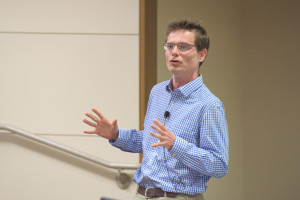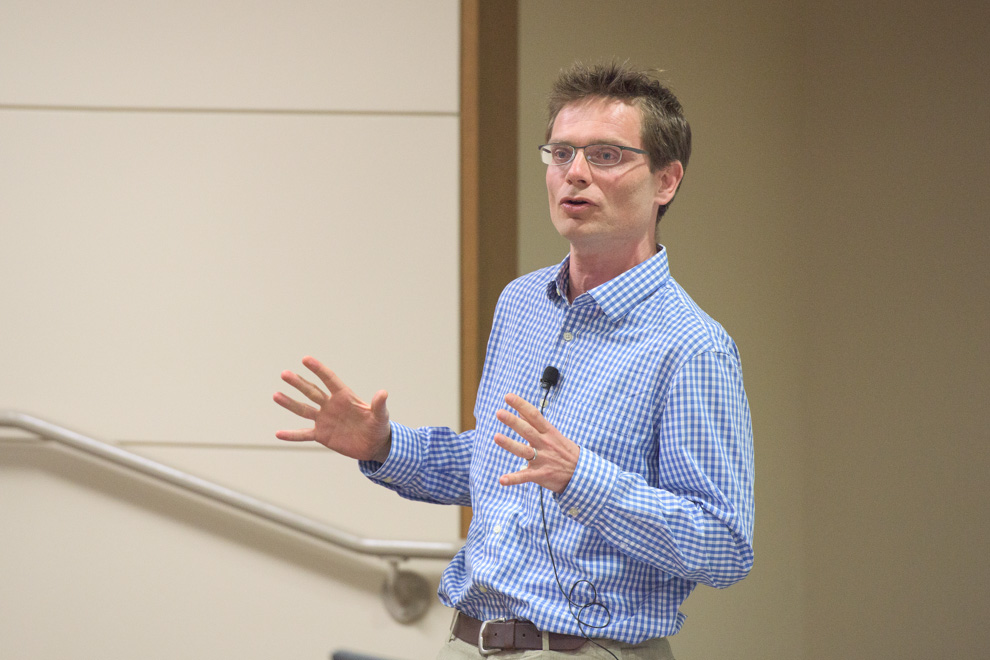The Faculty Senate convened for the first time spring quarter on Thursday, with Nick Bloom, preview chair of Committee on Undergraduate Admission and Financial Aid (C-UAFA), giving a report on C-UAFA’s activities and provided recommendations for improving the undergraduate admission process.

Bloom opened by describing the guiding principles behind undergraduate admissions and topics covered during this past year. Bloom then described his recommendations on how to improve the undergraduate admission process. According to Bloom, both C-UAFA and the actual process could benefit from changes.
Reflection on C-UAFA
Overall, Bloom noted that C-UAFA seemed to be short on time. During the past year, C-UAFA met eight times – more than the average of six – yet the committee always seemed to want for more time. According to Bloom, the committee dealt with an unusually high number of pressing topics over the past year, such as the redesign of the SAT and the push for more humanities representation at Stanford. Additionally, committee members would often miss meetings due to other commitments. These absences forced the committee to spend time getting everyone up to speed, again slowing down the process.
With the remaining time, the committee only had time to focus on admissions, foregoing discussion about financial aid. Dean of Admissions Richard Shaw commented that this move was not too concerning because the committee’s job regarding financial aid was to provide recommendations to the administration. Similarly, Provost John Etchemendy argued that Stanford already has an extremely good financial aid program and that most people are happy with the current processes.
After this discussion, Bloom moved on to describing the priorities of Stanford’s undergraduate admissions office. These priorities included students’ academics, such as SAT scores and GPA, as well as other factors, such as extracurricular activities. Other drivers included diversity and collegiate athletics.
Regarding execution of these priorities, Bloom described it as “fantastic,” but there were areas of improvement. For instance, there has been a treasure trove of data regarding initial applicants, but more data could be gleaned from students after acceptance.
Recommendations for the Admission Process
Bloom’s main focus for improving the process was on providing recommendations on how to help C-UAFA improve its governance.
Bloom first suggested to ameliorate C-UAFA’s time shortages by increasing the number of meetings per year from six to eight. He also argued that the committee should release the dates of all that year’s meetings at the beginning of the term to prevent scheduling issues and missed meetings.
Regarding the time duration of committee positions, Bloom argued that C-UAFA’s expertise could be improved by lengthening tenure times on the committee from three years to five years for regular members, and one year to two years for the chair. This way, there would be less turnover, causing less time spent on getting everyone up to speed understanding the admissions process.
Other former members of C-UAFA agreed to the proposal for longer tenure times, citing the committee’s special structure and many duties. Graduate School of Education professor Shelley Goldman, a former member of C-UAFA, mentioned that C-UAFA is closer to a board of directors in setup, which makes constant turnover less appealing. Similarly, Goldman implied that longer tenure times would dissuade people from joining the committee for purely personal interest.
Ultimately, as Bloom articulated, the undergraduate admissions process is very strong, but more could be done to make the governance of that process stronger.
Contact Christina Pan at [email protected].
